Patna: Manoj Chaudhary, 27, is a migrant Bihari worker on a mission. When he left his workplace in Pune, the mission wasn’t just to reach his village in Saharsa district for the Chhath festival and elections. It was also to survive the endurance test of the overcrowded special Chhath train. It means two days of standing without sleep or food, guarding his luggage like dear life. Going to the toilet is unthinkable on these trains.
The pandemonium of trains packed with migrant workers has become the quintessential Bihar story in contemporary Indian imagination. As the state goes to elections on 6 November, three terms of Chief Minister Nitish Kumar’s rule face tough questions. The toughest among them is this: Bihar’s workers are building big infrastructure projects everywhere in India but their own state remains trapped in despairing poverty and under-development. They suffer discrimination in big cities because of Bihar’s unchanging image.
Travelling home at this time of the year has become an annual Olympian ritual for Manoj Chaudhary. He changes three trains and takes one bus to reach his village to celebrate Chhath with his wife, children, and mother. He doesn’t have a suitcase or a duffel bag. He packs his clothes and blankets in a large blue water storage cylinder and carries it on his shoulder. There are no gifts or eatables in the cylinder.
The train pulls into Danapur railway station at 11:30 am, nine hours late. From there, Chaudhary rushes in a shared auto to Patna Junction for the next train to Saharsa.
“I have eaten only twice in the last four days. Barely slept, but got a seat so that was a relief. Many people didn’t even get that. I didn’t urinate for 30 hours because there was no space to reach the washroom. But every year we face this,” said Chaudhary, who works as a mason with a contractor for a daily wage of Rs 700.
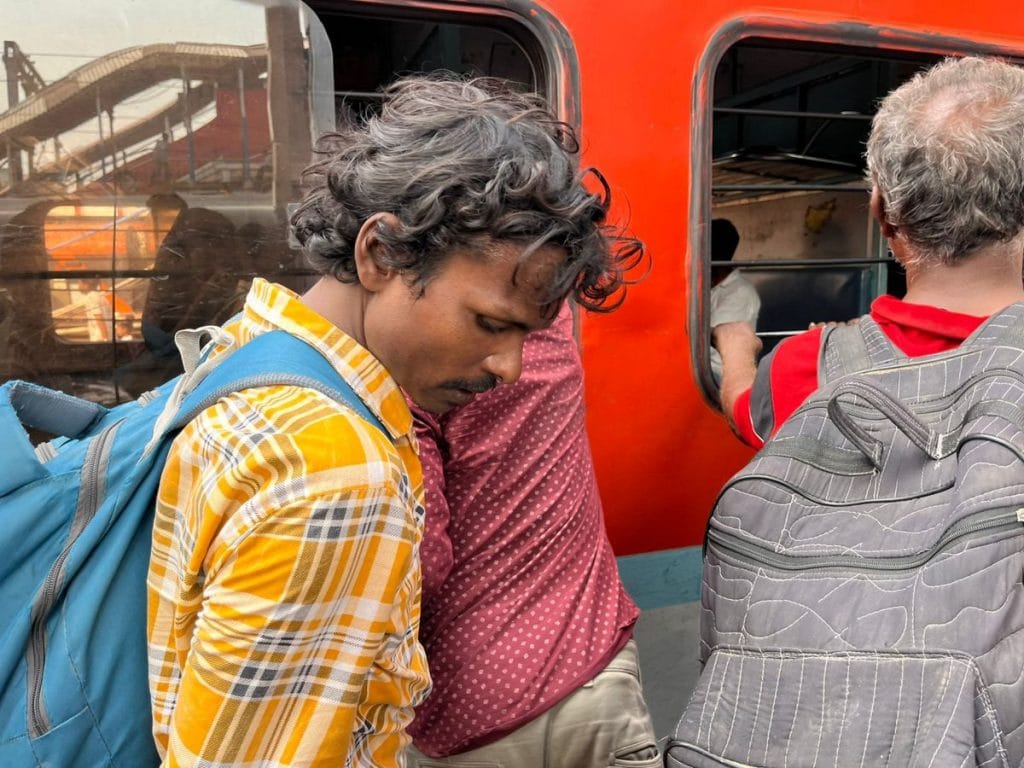
While his friends leave to buy food, he guards their luggage. Just as they return bearing dal-bhaat in a black polythene carry bag, one of them shouts excitedly: “Rajgir Express has arrived!” Chaudhary picks up his drum-shaped luggage and hurries toward platform no. 4 with hundreds of other homebound migrant workers.
“I need to save a seat and find a place to put the luggage, or else I will have to stand for the next six hours,” he said, running toward the train breathlessly.
Chaos breaks out.
People storm the doors of the train, throwing their bags in from the windows and sliding in through them as well. Some even break the emergency window glass to get in. Such scenes play out every year, making their way to TV screens and viral social media videos.
They say Raftar pakad raha hai Bihar (Bihar is catching speed) in the political ads, but the train’s raftar is very slow. Every party promises and never delivers. I just skip those reels and ads now
-Vikas Kumar, labourer working in Bengaluru
Every year, the central government makes big promises to ensure the smoother return of the migrant workers. This year, the Railway Ministry ran 12,000 special trains for Chhath Puja. It even played special Chhath songs between announcements at 30 stations across the country, like Kaanch hi baans ke bahangiya (roughly meaning, the fresh bamboo carrier sways with its sacred load). But the situation wasn’t any better.
Migrant workers travel from every corner of India — Chennai, Bengaluru, Pune, Delhi — but everyone has the same undignified struggle. First jostling for hours just to enter the train, then fighting to get a seat.
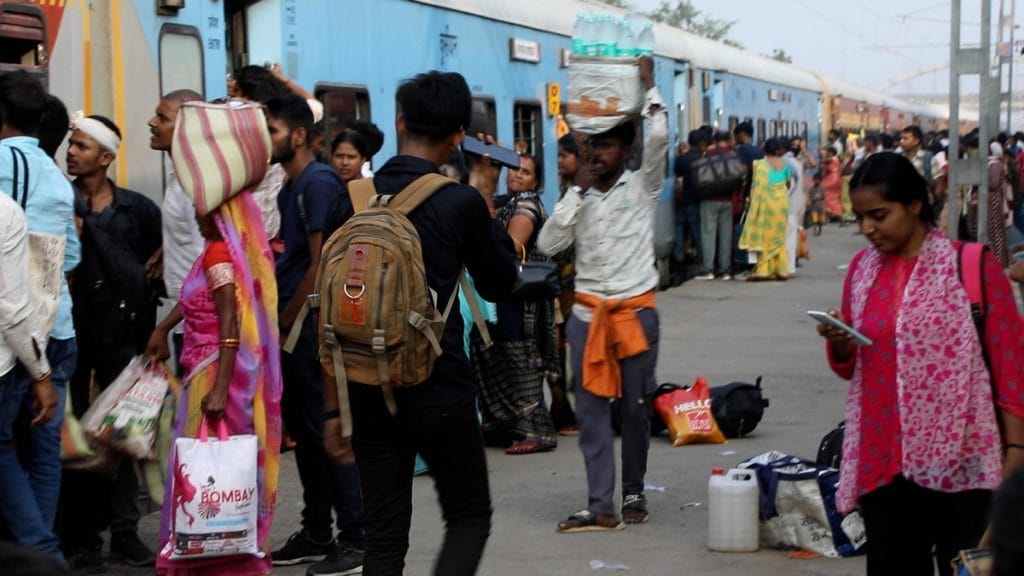
This year, it’s not only the Chhath Mahaparv of Bihar but also the biggest festival of democracy — elections. It’s a moment of reckoning. The migrant workers will leave the state after casting their votes, with the heavy knowledge that Bihar has a lot of catching up to do with the rest of India. They have seen and contributed to the India Story take-off in Bengaluru, Hyderabad, Delhi, Gurgaon, Noida, Mumbai, and Pune. But few big companies or factories have come to Bihar to invest and create jobs.
Political leaders are promising to meet them personally at the ghats this time, but the pain and problems of migrant workers have stayed the same for years. Toiling in faraway cities, they see Bihar on their phone screens. Short videos, sarcastic clips, memes, Reels, and ads play out the harsh reality on a loop.
“I have been living in Bangalore for 25 years, and every year I come to Bihar like this. Crowded trains, no proper education or health facilities. Water and electricity are better, but Bihar needs more,” said tea-seller Vijay Shankar, who is travelling with his daughter to Begusarai from Bengaluru in the Rajgir Express.
A co-passenger counters: “Did you see how many bridges have been built in Bihar? The roads are everywhere now. The schools and hospitals will also get better dheere dheere (slowly, slowly)…”
Shankar swiftly slaps him down with a line from the web series Panchayat, as several others laugh: “Yahi to dikkat hai, sab kuch bahut dheere dheere ho raha hai”— this is the problem, everything is happening very slow.
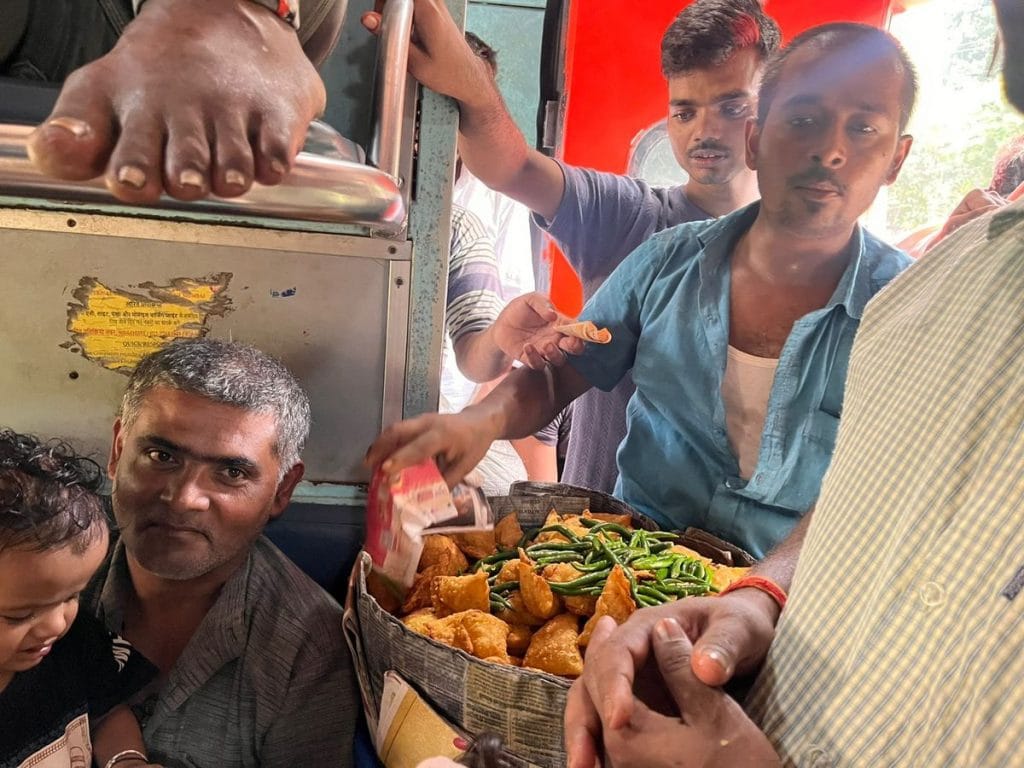
Saraswati Chandra, the Chief Public Relations Officer for the East Central Railway, told ThePrint in an official communication that besides operating 12,075 special trains that ferried over 15 million passengers, the Indian Railways had established holding areas at 76 stations, including a permanent one at the New Delhi Railway Station, which can accommodate over 7,000 passengers at a time.
The official added that this year, a large number of Railway Protection Force and commercial staff were deployed at each station to ensure proper seating of passengers, especially those from unreserved category.
Also Read: Labourers, masons, fitters going online for jobs. A LinkedIn for construction workers
No place at home
From every big city, huge groups of desperate Bihari workers clamber onto the train, shouting, “Go inside, make some space for me.” Among them are Vikas Kumar and his younger brother Abhishek, who stood in line for nine hours just to board the special train from Bengaluru to Bihar.
“We work as labourers in the city for a company. We load and unload electronics, fridges, washing machines. Chhath is the biggest festival for us. Back in Bihar, my mother follows many rituals, but ours starts here — getting a spot on the train and reaching home safely with our luggage,” said Vikas, 26, exhausted from the three-day journey.
There is that fear of robbery too.
He and his younger brother take turns to sleep so that their luggage is never unattended.
“Last time my bag and phone got stolen. So this time I have made a plan not to sleep so I can guard my luggage,” said Abhishek, 22. “I have taken one month’s leave. I won’t get paid for it. But I had to come home for Chhath.”
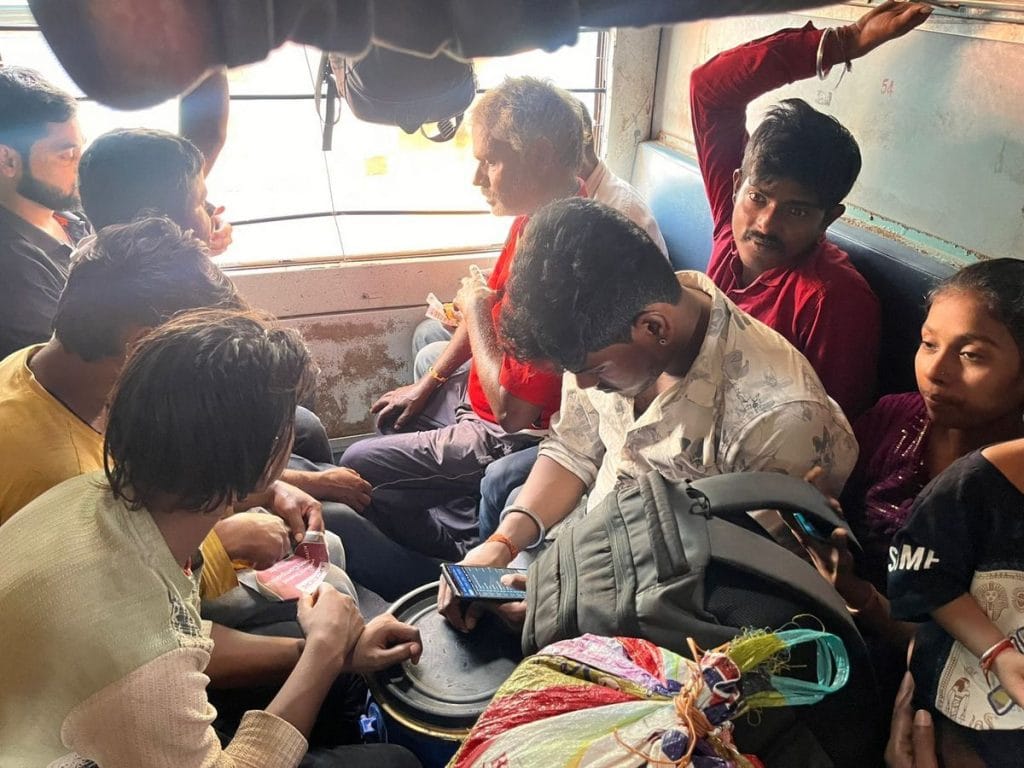
They each earn Rs 15,000 per month in Bengaluru with no paid leave, even for sickness, or bonus.
Abhishek and Vikas have built a new life in Bengaluru. The work is gruelling but the living conditions are good, they say: better roads, big buildings, people who talk nicely to them, superior education and healthcare. They arrived in Bengaluru when they were 15 and 20 to work but their uncle, who sells tea in the city, said they could study later.
That hasn’t happened yet but they now know a little Kannada. Earlier it was a struggle; people treated them badly because they couldn’t speak the language. Now they know the basic niceties to get by: “Nivu hegiddiri? Nivu uta maḍuttira?”—How are you? Will you eat?
We don’t come home even when we come home; we are here just to fulfil our responsibilities
-Abhishek Kumar, labourer working in Bengaluru
“I love South Indian movies, I have finished three on this journey. Now my data pack is finished,” said Vikas.
Like Vikas and Abhishek, many of the travellers are immersed in their smartphones, mostly Chinese makes such as Oppo, Vivo, and Redmi. But when the Ganga River appears outside, they crane their necks to see it and fold their hands.
“They say Raftar pakad raha hai Bihar (Bihar is catching speed) in the political ads, but the train’s raftar is very slow. Every party promises and never delivers. I just skip those reels and ads now,” said Vikas.
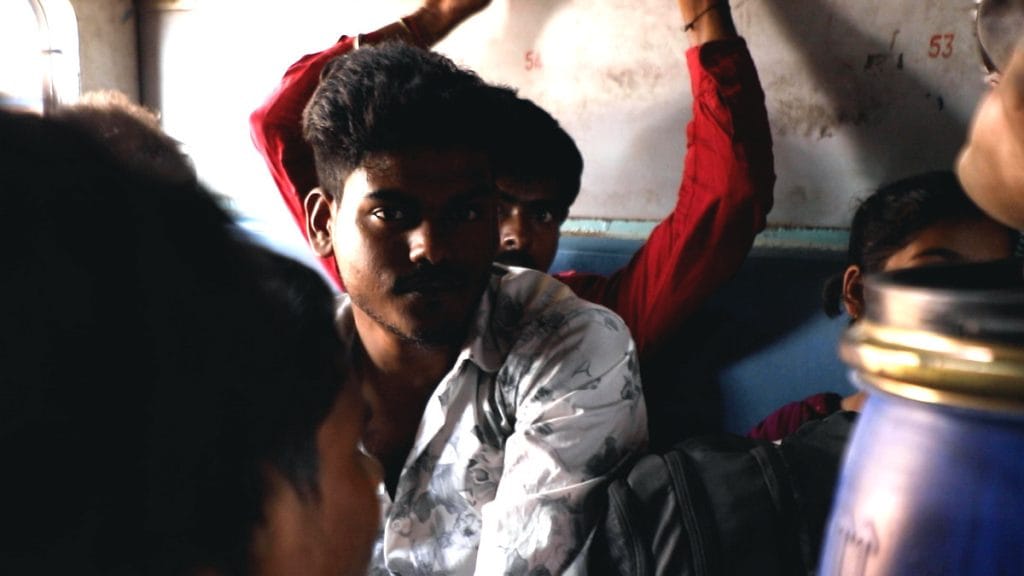
The Bihar Caste Survey 2022-23 estimates that 2.65 crore people from the state are migrant workers but in most cases, the mobility is not upward. A 2021 sample survey by the International Institute for Population Sciences across 36 Bihar villages found most migrants are stuck in low-paying jobs due to their lack of education and skills, sending back an average of around Rs 35,000 a year in remittances (compared to Rs 55,000 for Eastern UP families). For 48 per cent of those households, these meagre remittances are the only source of income. Still, it’s something.
“The family needed money so we had to work. Earlier we tried in Bihar, but there was irregular work and people wouldn’t pay on time. I used to work 12 hours and got Rs 6,000 a month, and that too not on time,” said Abhishek.
“No one wants to leave their home, but family responsibilities make them.”
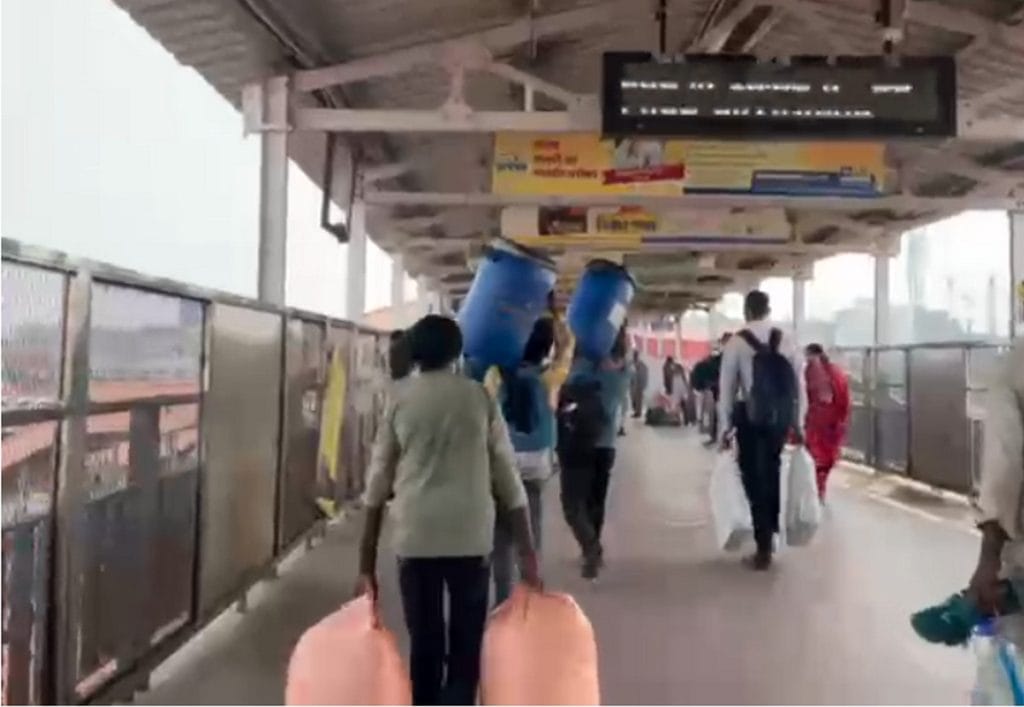
Votes in transit
Political parties in Bihar have been talking up the homecoming they have planned for the Chhath arrivals. On the Rajgir Express, videos targeting them blare from phones. BJP ads promising an ethanol factory, Tejashwi Yadav talking jobs, Jan Suraaj Party’s Prashant Kishor walking from village to village taking up their cause.
Many watch the ads and speeches, then curse the parties.
Thousands of kilometres from home, reels and video calls are their only connection with the political news of Bihar. “The roads are better,” “electricity has improved,” “schools and hospitals are the same as you left them,” are what many hear from their families.
We come once or twice a year, and we have seen that roads are better and electricity supply has improved, but what about jobs here, the companies? I will vote for the party that will give me a job here
-Vijay Shankar, tea-seller in Bengaluru
Manoj Chaudhary talks to his wife every night for an hour. His children go to school now; he never did. But on the jam-packed train, his cynicism runs deep. Leaders such as RJD spokesperson Mrityunjay Tiwari have been trying to “persuade” migrants to extend their visit to vote, but Chaudhary is not convinced. It all seems abstract.
“As of now, every party looks useless,” he said. “I don’t know how YouTube knows I’m from Bihar. It keeps showing me these ads. But these won’t work on me. If I vote, it will be for whoever my village votes for. Anyway, no one helps us.”
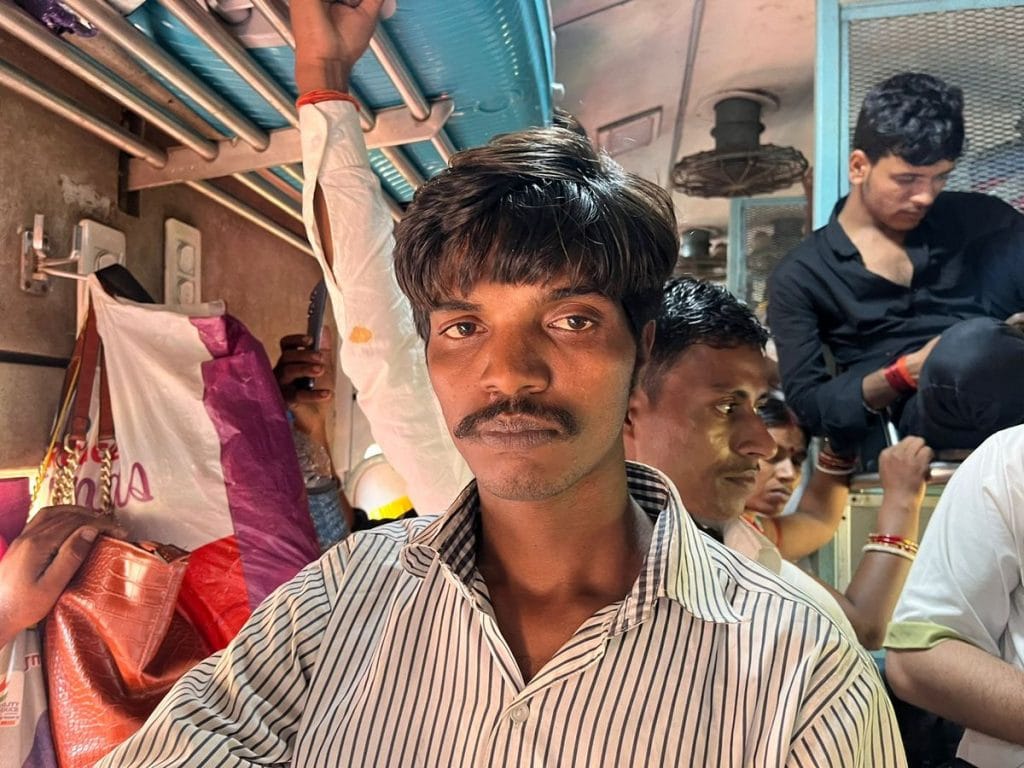
But others are tuning in with more interest, following the news and the comments section of YouTube videos.
“I have seen on my phone people saying how Modi ji hasn’t done anything for migrant workers. People like us face discrimination in villages in the name of caste, and in big cities we are treated badly because we are Bihari — but we still survive. I am hoping for a government that will make my life better,” said Suresh Paswan of Supaul district, who works in Chennai as a labourer. Other than calls from relatives, he gets much of his news from the Facebook app on his Redmi Smartphone.
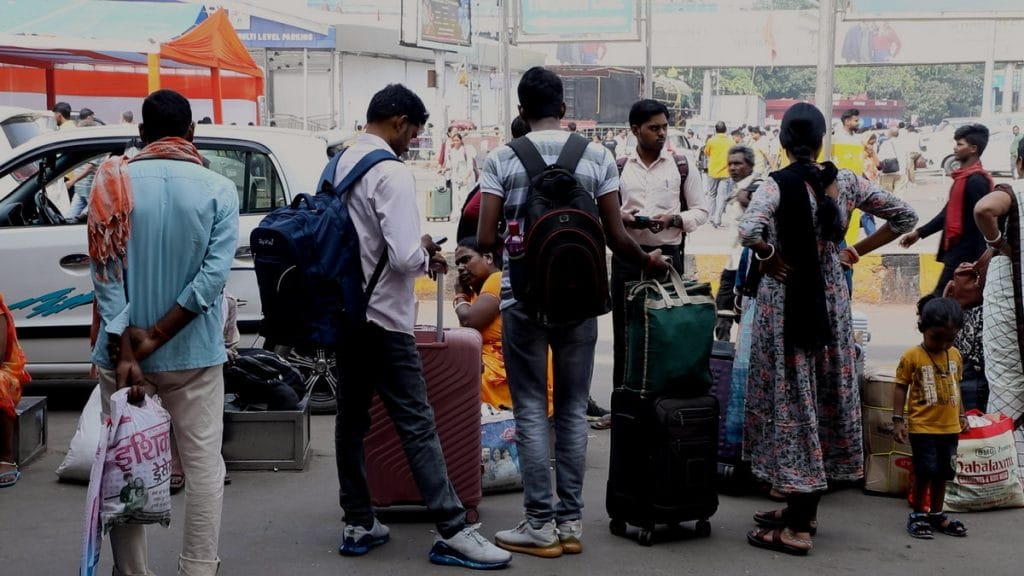
Some such as Vijay Shankar are impressed by Prashant Kishor’s focus on the plight of migrants but sceptical about whether it will translate to votes.
“He says really good stuff that matters to people. He is one of the few leaders who raised the concerns of those who leave their home for work, but he won’t make space in the government — maybe in another five years,” he said.
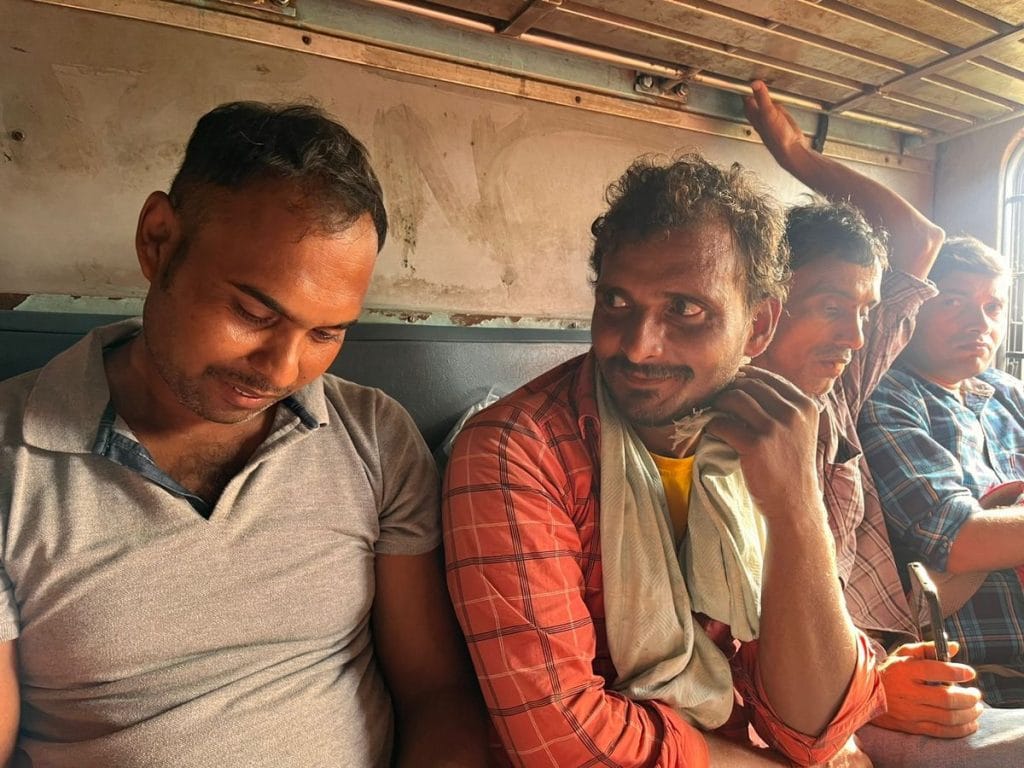
Migrant workers don’t speak as much as the other Bihar residents about health, education, or roads. Their core problem is the lack of industries and companies in Bihar. All they want is to be near their home. For that, jobs have to be created in Bihar for Bihari people. Even the Rs 10,000 welfare dole for women doesn’t tempt them.
“We live a cursed life. People still use ‘Bihari’ as a gaali. The government couldn’t even fix that. We come once or twice a year, and we have seen that roads are better and electricity supply has improved, but what about jobs here, the companies? I will vote for the party that will give me a job here,” said Shankar.
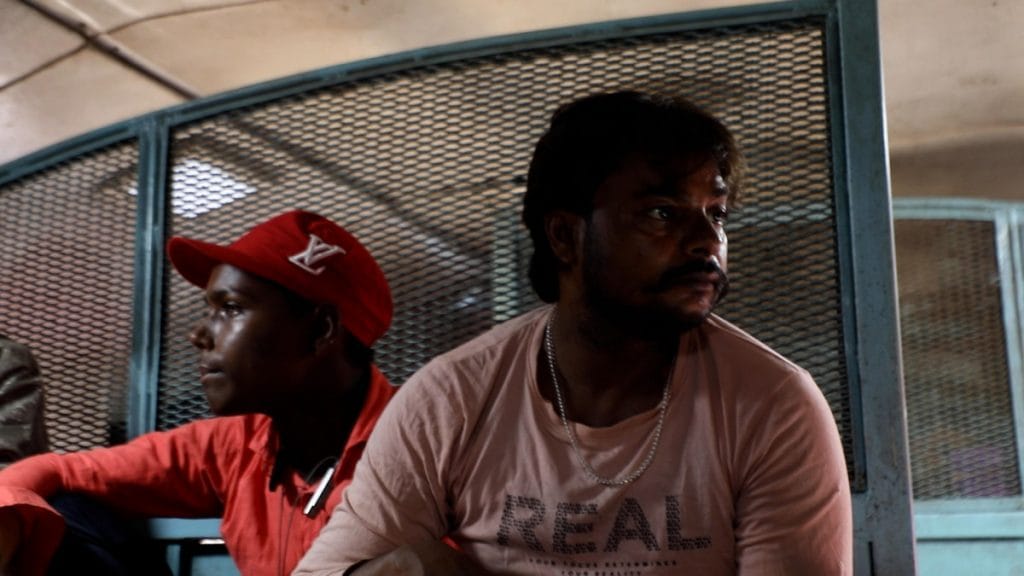
The BJP has sensed this frustration.
One of its campaign ads shows a young man leaving for work. An old neighbour calls out, “Leaving again?” The man replies, “No, I’m going to Buxar. BJP has opened an ethanol factory there.” Then flashes the tagline: Raftar pakad raha hai Bihar (Bihar is picking up speed). Another ad shows an elderly woman claiming lakhs are getting government jobs. But migrants packed into these trains don’t buy it.
“For a long time, Chief Minister Nitish Kumar used to take pride in migrants, saying Biharis are building the nation. Biharis are building the nation, but who is building Bihar?” asked Shankar.
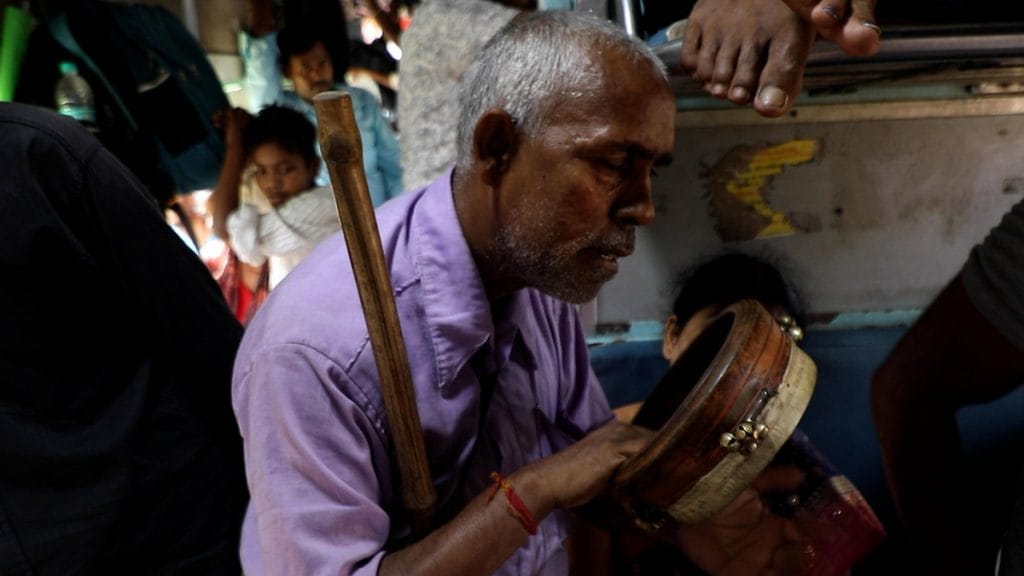
Also Read: Bihar is seeing a stock market revolution. Patna to Ara, people moving from FD to futures
No hero’s welcome
When Manoj Chaudhary reaches home late at night after travelling for the better part of the week, he follows the protocol of greeting all the family elders first while his wife waits impatiently in another room. His two children are asleep and he doesn’t wake them.
“You have become so thin, don’t you get food there?” his wife exclaimed when she finally set eyes on him.
Chaudhary has been away for months. His wife manages the house and two children on what he sends back from Pune. He takes out crumpled notes from his pocket and hands them to his mother for the festival. She puts her hand on his head and cries on his shoulder. He doesn’t hand his wife any cash but promises her he’ll take her and the children shopping the next day.
“If I give money to my wife in front of my mother she won’t like it. But I will take her shopping and will buy her green sari, that’s her favourite colour,” Chaudhary said.
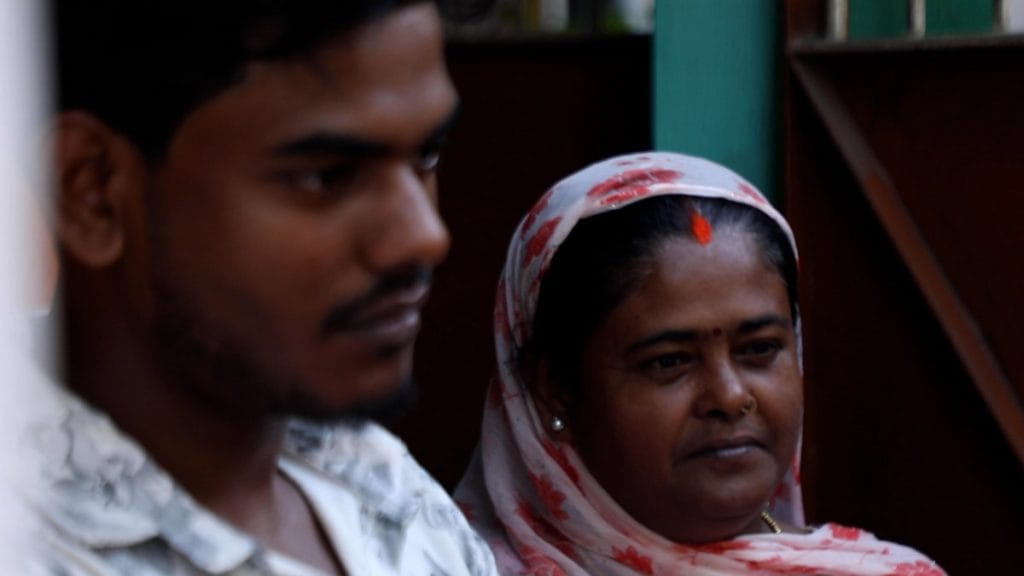
In Begusarai, brothers Abhishek and Vikas stagger out of the Rajgir Express after four days of travel but there’s no one to greet them at the station. Their mother is waiting at their single-storey house nearby, which they share with another family. The Diwali lights are still up, but the brothers are the ones who must make Chhath special.
They go to bed, but as soon as they wake up their mother rattles off a list of chores. The work waiting for them at home during their holiday appears endless.
They have to visit their sister and buy her gifts, look for a small piece of land they have been saving for, buy sweets, saris, and fruits for Chhath, visit relatives, and help their mother shift the almirah and bed. That’s just to start with.
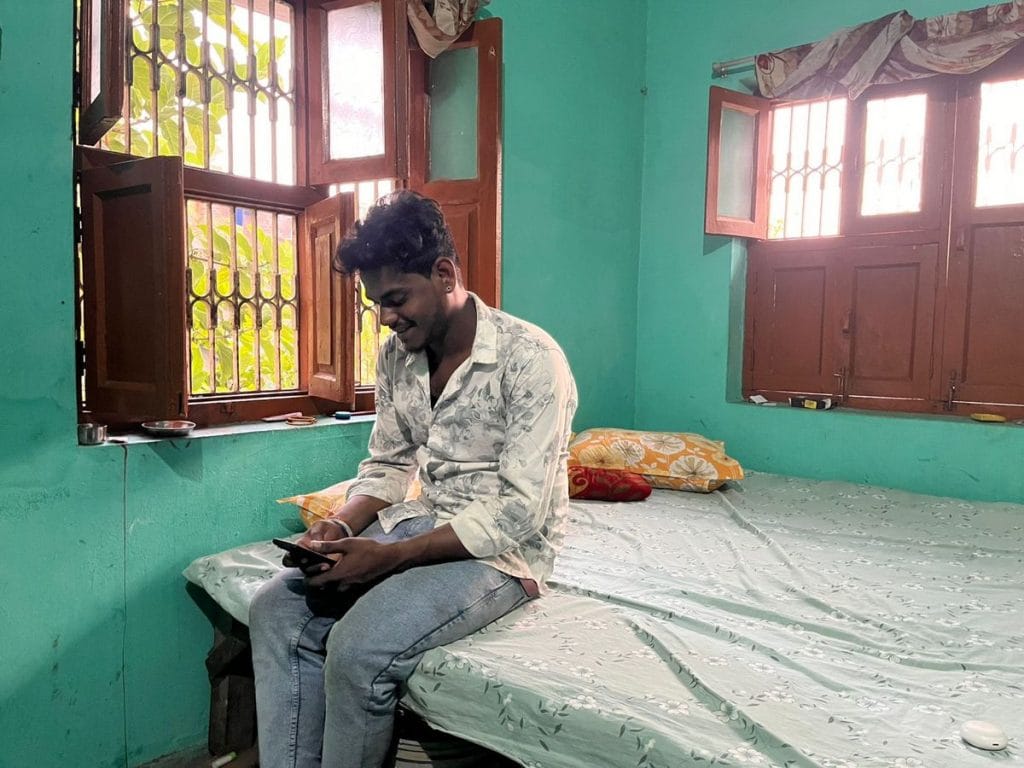
“This is the only time I get to see them. I’ve never had time to spend with my mother. This time I will also keep going from one place to another meeting relatives. I want to do something for my mother. But will I be able to do that?” said Abhishek, who has been working since he was 15.
Both brothers have resigned themselves to the fact that they will not be getting any pampering or special treatment. But they enjoy the food and familiar haunts.
“This is Chhath time, so mummy can’t cook onion and garlic in the kitchen. There is a chaat stall nearby in the market; we go there once a week to eat that, as we don’t get it anywhere else,” said Vikas.
For Abhishek, his small savings go into returning every year, but homecoming has become just another duty to discharge.
“Seeing my village and town like this feels like I have travelled through a time machine where not much has changed,” he said, preparing for a nap. “Ghar aakar bhi hum log ghar nahi lautte, zimmedaari poori karne lautte hain”—We don’t come home even when we come home; we are here just to fulfil our responsibilities.
(Edited by Asavari Singh)



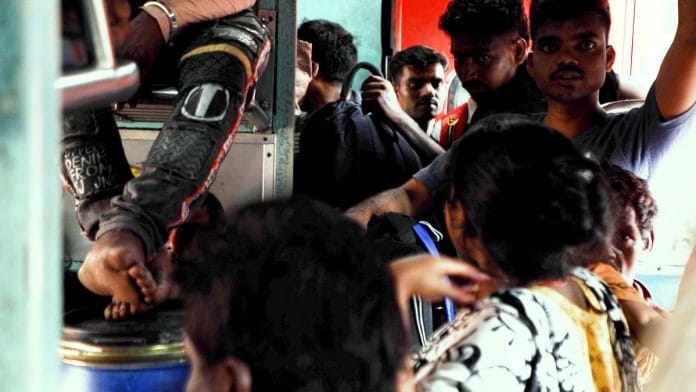



After twenty years in power, almost continuously, only CM Nitish Kumar can provide an honest answer to this anguished query.
Excellent writing.